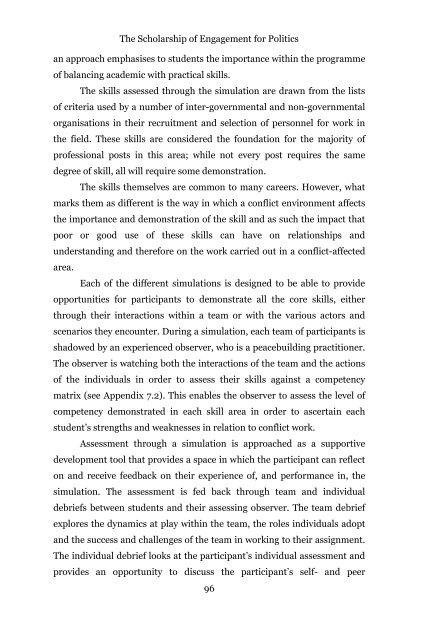The Scholarship of Engagement for Politics: - Higher Education ...
The Scholarship of Engagement for Politics: - Higher Education ...
The Scholarship of Engagement for Politics: - Higher Education ...
You also want an ePaper? Increase the reach of your titles
YUMPU automatically turns print PDFs into web optimized ePapers that Google loves.
<strong>The</strong> <strong>Scholarship</strong> <strong>of</strong> <strong>Engagement</strong> <strong>for</strong> <strong>Politics</strong><br />
an approach emphasises to students the importance within the programme<br />
<strong>of</strong> balancing academic with practical skills.<br />
<strong>The</strong> skills assessed through the simulation are drawn from the lists<br />
<strong>of</strong> criteria used by a number <strong>of</strong> inter-governmental and non-governmental<br />
organisations in their recruitment and selection <strong>of</strong> personnel <strong>for</strong> work in<br />
the field. <strong>The</strong>se skills are considered the foundation <strong>for</strong> the majority <strong>of</strong><br />
pr<strong>of</strong>essional posts in this area; while not every post requires the same<br />
degree <strong>of</strong> skill, all will require some demonstration.<br />
<strong>The</strong> skills themselves are common to many careers. However, what<br />
marks them as different is the way in which a conflict environment affects<br />
the importance and demonstration <strong>of</strong> the skill and as such the impact that<br />
poor or good use <strong>of</strong> these skills can have on relationships and<br />
understanding and there<strong>for</strong>e on the work carried out in a conflict-affected<br />
area.<br />
Each <strong>of</strong> the different simulations is designed to be able to provide<br />
opportunities <strong>for</strong> participants to demonstrate all the core skills, either<br />
through their interactions within a team or with the various actors and<br />
scenarios they encounter. During a simulation, each team <strong>of</strong> participants is<br />
shadowed by an experienced observer, who is a peacebuilding practitioner.<br />
<strong>The</strong> observer is watching both the interactions <strong>of</strong> the team and the actions<br />
<strong>of</strong> the individuals in order to assess their skills against a competency<br />
matrix (see Appendix 7.2). This enables the observer to assess the level <strong>of</strong><br />
competency demonstrated in each skill area in order to ascertain each<br />
student’s strengths and weaknesses in relation to conflict work.<br />
Assessment through a simulation is approached as a supportive<br />
development tool that provides a space in which the participant can reflect<br />
on and receive feedback on their experience <strong>of</strong>, and per<strong>for</strong>mance in, the<br />
simulation. <strong>The</strong> assessment is fed back through team and individual<br />
debriefs between students and their assessing observer. <strong>The</strong> team debrief<br />
explores the dynamics at play within the team, the roles individuals adopt<br />
and the success and challenges <strong>of</strong> the team in working to their assignment.<br />
<strong>The</strong> individual debrief looks at the participant’s individual assessment and<br />
provides an opportunity to discuss the participant’s self- and peer<br />
96
















